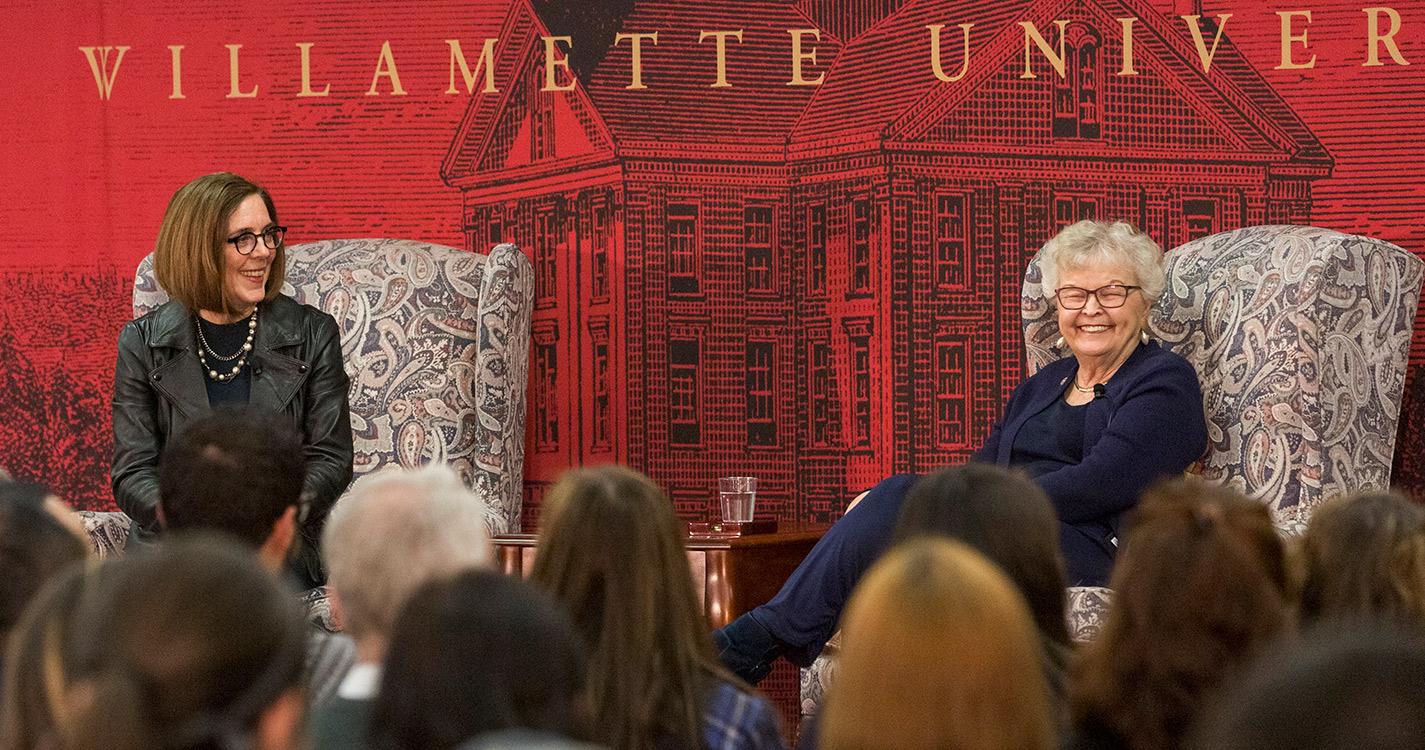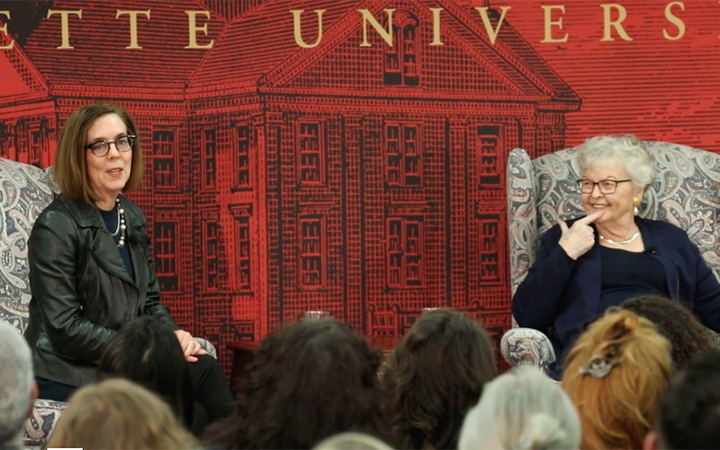“I wanted to be a voice for the voiceless,” Gov. Kate Brown told a crowd gathered in Willamette’s Cat Cavern on Thursday after being asked about her political background. She encouraged others to find what makes them tick.
“I got into this work because of my commitment and passion for justice and equality,” Brown said. “It’s not always the focus of what I do every day, but it gets me up in the morning. You have to follow your heart, but you also have to make a living.”
In a conversation both frank and funny, Oregon’s only women governors — Brown and former Gov. Barbara Roberts — shared the successes and struggles they’ve had breaking political barriers for an event called the Daniel P. Santos Diversity Speakers Series. Moderated by Norma J. Paulus Professor of Law Robin Morris Collin, the event included remarks from President Steve Thorsett and the Latinx Law Student Association (LLSA), which sponsored it.
Latinx President Natasha Torres said the association made history, both for its first time hosting the governors and a record attendance of Latinx students at Willamette College of Law. This year, 29 students were enrolled, the highest number the college has seen in five years, she said.
The speaker series, named after Santos JD’86, aims to provide a space for dialogue between students from diverse or marginalized communities. LLSA members asked the governors to speak in honor of Women’s History Month.
History of breaking barriers
Despite their divergent backgrounds — Roberts is an Oregon native who successfully advocated for her disabled son while divorced and financially strapped; Brown is a Minnesota-raised attorney who was appointed to public office after graduating from law school — the two share much in common.
Both served in the House of Representatives, as secretary of state and as governor. Both are advocates for human and civil rights and the environment. They also know a little bit about being first — in 1990, Roberts became the first woman governor in the state and in 1981 the first woman elected house majority leader. In 2004, Brown became the first woman to serve as Oregon’s senate majority leader and, in 2015, the first openly bisexual governor in the nation’s history.
As governor, Brown's judicial appointments have created the first woman-majority Oregon Supreme Court, Oregon's first African-American woman justice and first woman chief justice."
Women have played an outsized role throughout history, Roberts said, not only as pioneers, but also “community-builders” who founded the first farms, schools, churches and orphanages. Women are making history and taking leadership every day, she said, “and nowhere is that more apparent than in the political arena.”
She said, “It does make a difference who’s at the table.”
Challenges, inclusion and future
Double standards and adversity followed both women during their time in office.
Years ago, Roberts said, women were considered knowledgeable about mental health and education, but not economic development and the forest industry. Under media scrutiny today, Brown said, “women in political office need to be likeable and competent, while men clearly don’t need to be either.”
Asked what diversity, equity and inclusion means to them, Brown said she used to see diversity as “frosting on the cake.” But once she became secretary of state in 2008, she realized it had to be an essential part of the political and everyday conversation, “the recipe” for the cake, she said.
Quoting Roberts, Brown said, “If you’re not at the leadership table, you’re on the menu.”
Willamette University has a long history of graduating women leaders. Alumnae include Oregon Supreme Court justices Virginia Linder JD’80 and Sue Leeson ’68, JD’81, as well as Sen. Lisa Murkowski JD’85 and Norma Paulus LLB’62, who recently passed away.
In a speech opening the event, President Steve Thorsett said the university is proud to support those “who have done what others thought they could not or should not do and whose success paved the path for generations of women to achieve more.”
“To all the women who broke barriers and glass ceilings and who pushed through layers of resistance and discrimination — thank you,” he said. “May we continue to add many more lines in the unending story of women’s progress and achievement.”


